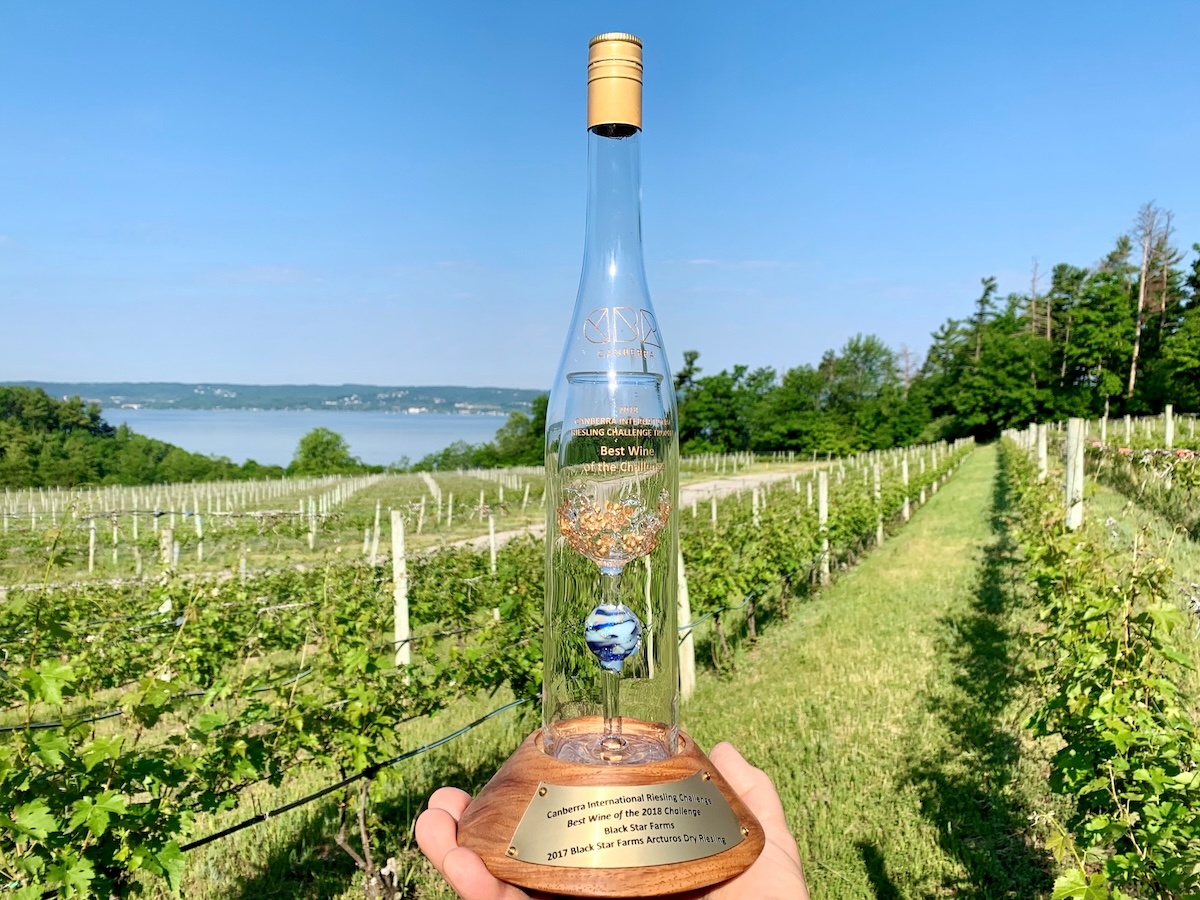
What Does It Take to Make an Award-Winning Wine?
Aurora Cellars and Black Star Farms on their national and international medals
By Eric Cox | Sept. 20, 2025
Black Star Farms Head Winemaker Lee Lutes wasn’t sure what to think. His ringing phone had yanked him from a midnight sleep. Who could it be? Dead-of-night phone calls often portend some grim new development.
But not this time. This was a call from the future—literally—and it brought some of the best news he’d ever heard.
It was 2018, and when Lutes groggily answered his phone, he was greeted by an excited Jim Trezise, who was in Canberra, Australia, some 14 hours ahead of still-sleeping America. An internationally known wine expert calling from tomorrow isn’t an everyday occurrence, nor was his urgent news mundane.
Trenzise was calling from the prestigious Canberra International Riesling Challenge (CIRC). Black Star Farms’ 2017 Arcturos Dry Riesling, Trezise explained, had just been awarded top honors, taking home Best Wine of the 2018 Challenge, Best Dry Riesling of 2018, and Best American Riesling of 2018.
That’s no small achievement for Black Star Farms, the scenic 160-acre winery south of Suttons Bay. After all, the Canberra competition is the largest, most respected contest of its kind in the southern hemisphere, its results serving as a global benchmark for the Riesling varietal. Five hundred wines are submitted to CIRC annually from all over the world, including top Riesling-producing countries like Germany, France, New Zealand, Austria, and Australia. So contestants are truly pitting their wines against the world’s finest.
When Lutes got the news, he was stunned. It was a major accomplishment for everyone at Black Star Farms, and it helped establish northern Michigan as a top wine-producing region.
A Rising Tide Lifts All Boats
Taylor Simpson, co-owner of Simpson Family estates (parent company of Aurora Cellars and Good Harbor Vineyards on Leelanau Peninsula), is also proud of her winery’s awards. But she’s quick to point out that wine competitions don’t always have practical value for wineries.
Trophies and medals are nice, but according to Simpson, the underlying strategy is to get Michigan wines into wine judges’ mouths. “More wine producers are starting to submit their products to competitions in order to gain more national recognition,” she says.
“But also we know that consumers like awards,” she adds, explaining how competition success can drive bottle sales by guiding new wine drinkers to recommended products bearing a winner’s ribbons, medals, glowing reviews, and other accolades.
In other words, that bling can make sales sing.
More importantly, Simpson says entering wines in national and international wine competitions can and has uncorked much of the world’s interest in northern Michigan wines. “If we don’t send our wines to those competitions, the chances of those judges tasting those wines is slim,” Simpson tells us from her Lake Leelanau winery.
If they notch big competition wins, as many of Aurora Cellars’ wines have, the reputation of the entire region producing them comes squarely into view on a much wider scale. Of course, this recognition is a major boon for northern Michigan’s still blossoming wine industry. Even a single win at one of these big contests can focus many important eyes on its products.
“Receiving top merits on wines grown and produced in the Traverse Wine Coast is exciting for us and helps reinforce the message about the quality being produced in the Michigan wine industry,” Simpson says.
Last year, Aurora Cellars’ 2020 Cabernet Franc earned a silver medal at the venerable San Francisco Chronicle Wine Competition, after receiving a gold medal at the 2023 Texas Sommelier Conference (TEXSOM) Awards. Additionally, Aurora’s Brut Rose, Blanc de Blanc, and Gruner Veltliner, among others, have earned medals.
Strategies for Success
Entering wine contests isn’t as simple as it may seem. Entry fees and shipping costs, which can be substantial, have to be considered along with other factors. It’s not unusual for producers to spend thousands entering competitions, a significant price tag that must be weighed in a narrow-margin industry.
Luckily for their wallets, competitors aren’t out to win every award, so wineries like Aurora Cellars and Black Star Farms carefully select their competitions, weighing which ones might be more favorable to their varieties.
Black Star Farms focuses on CIRC because the Leelanau Peninsula, with its mixed glacial soils and northern maritime climate, make it perfectly suited for the Riesling varietal. Plus, having traveled through Australia extensively, Lutes learned that the local judges personally prefer a particular dry Riesling—the kind Black Star Farms tries to produce.
“Our wines are more aligned with a style of Riesling the Aussies really like: more acid forward, a leaner fruit profile, more racy,” he said, noting that the strategy seemed to pay off.
Like Lutes, Simpson personally chooses all of Aurora Cellars’ competitive wines and the contests in which they compete. While Black Star Farms chooses CIRC, Aurora enters the San Francisco Chronicle Wine Competition and TEXSOM.
Shipping wine across the country, or the world, is also part of the competition equation. (If you’ve seen the movie Bottle Shock, you’ll know what we mean.)
“The [award winning] 2017 Arcturos was one of those wines that, when we shipped it to Canberra, I felt it was showing a little young in the bottle, a little tight,” Lutes says as an example. “But, when I got the midnight phone call, I thought, ‘Oh my god! Something must’ve transpired along the way that allowed that wine to absolutely sing that particular day.’
“That’s what it comes down to—how that wine tastes on a particular day, the day it’s being judged,” he concludes. “My hope is that it’s going to reveal itself as something remarkable on the day a judge tastes it.”
But, it doesn’t always work out that way. Jostling during transport, temperature changes en route, and other factors can make or break a wine’s delicate qualities. This injects uncertainty into winemakers’ minds, and sometimes they forgo competing based on minute details.
For example, Black Star Farms reluctantly entered CIRC this year, and may not in the future, because the organization changed their shipping policies. It might seem trivial to some, but Lutes thinks the changes could be detrimental to wine quality once it reaches the final destination.
At the Awards
Once the wine is shipped, what’s it like for the winemakers at these competitions? Who attends and why?
For the most part, no one except the contest organizers and judges attend. There are no bleachers or team pennants. And, no, “Corky” the wine mascot won’t be there for selfies or swag giveaways. However, there may be public tastings after the officials have concluded their ratings.
By all accounts, competitions are rigidly organized affairs that feature rows of volunteer judges eyeing, nosing, sipping, and spitting wine for hours.
Both longtime wine industry veterans, Lutes and Simpson have each served as wine judges. “Judges are selected because of their experience,” Simpson says. “Wine buyers, winemakers, and sommeliers all have experienced palettes and make good judges.”
Lutes echoes Simpson’s take on the rigors of wine judging.
“I judged for 15 years of my career, doing two or three competitions a year,” he says. “They can be exhausting. You’re tasting 60 to 100 wines in a day. You’d do half of them before lunch and the other half in the afternoon. When you’re tasting and spitting all day, it can be fatiguing. But it can be a really good way to provide a winemaker with some positive input.”
Ultimately, winemakers enter competitions (and judge them) for the love of wine, bragging rights, and selling points. But the real beneficiary in these competitions seems to be northern Michigan’s growing wine industry itself.
Simpson sums it up: “We have a region that can grow such high quality fruits, and our wines showcase really well nationally. I think wine judges around the world are starting to realize the quality northern Michigan can produce.”
Trending

Building the Life You Want
Who needs a life coach? While people seek out life coaches for a variety of reasons, one theme is almost always present, co… Read More >>
Retired Recess Back in Session
Mt. Holiday in Traverse City is calling all “older kids” (50+) to Retired Recess! Held every Thursday from noon-… Read More >>
One, Two, Punch! at Significant Strikes
Significant Strikes in Traverse City is starting the year off with a high kick. Three of their most popular classes—Bo… Read More >>


